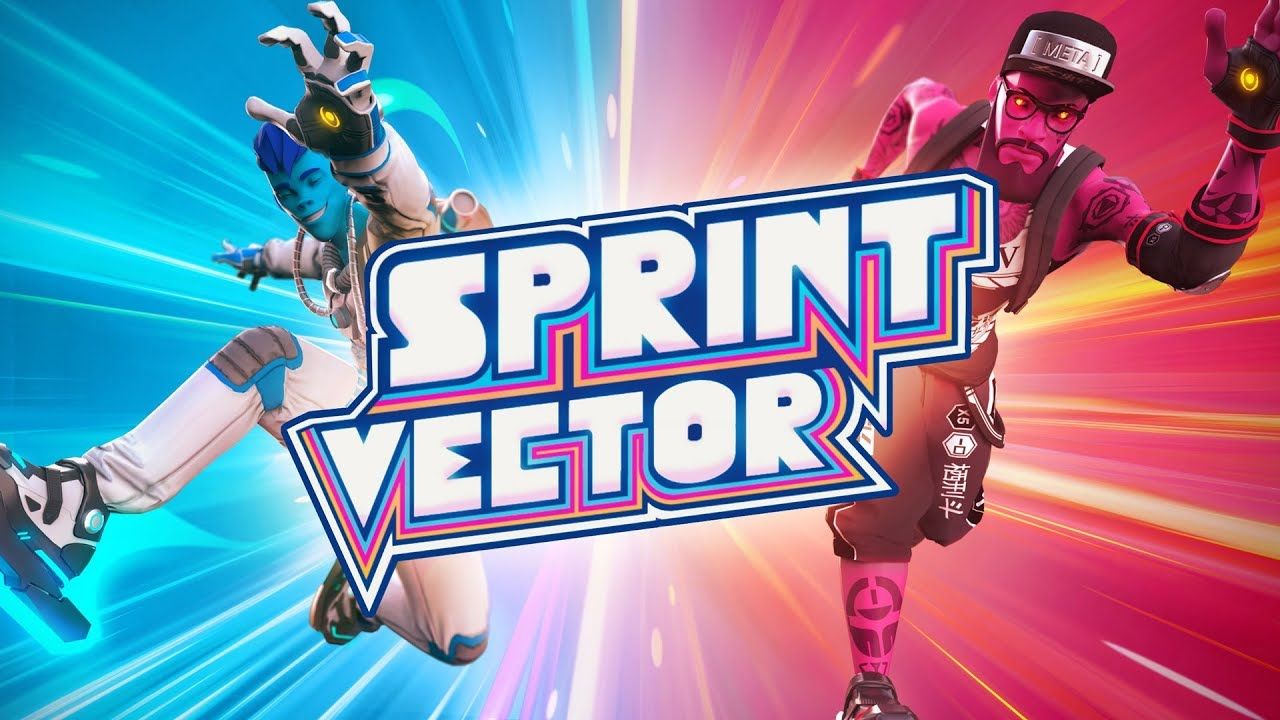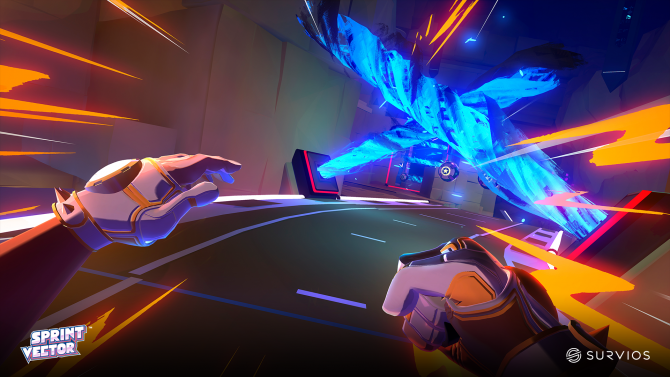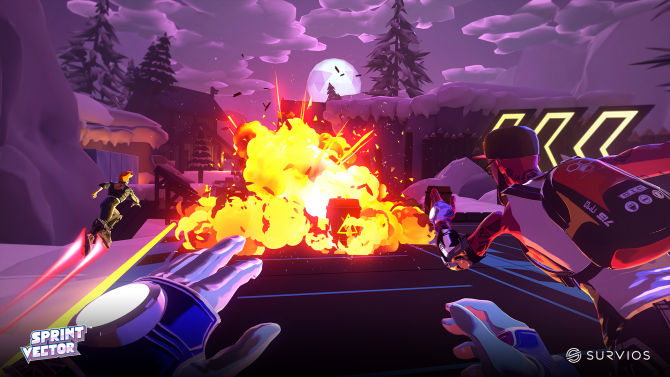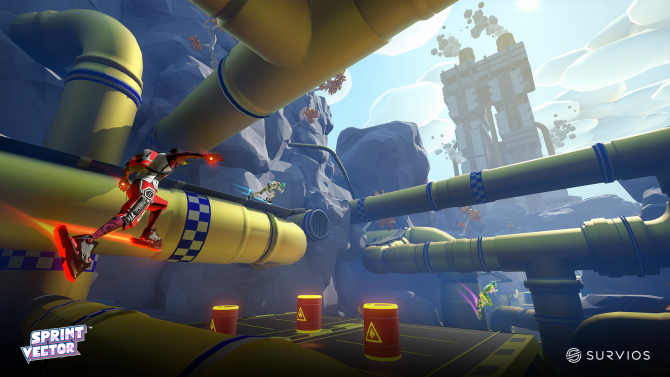After the success of the studio's first project, Raw Data, many fans of the game (including myself) were hoping that Survios' next project would be within the same realm; offering more refined gameplay and making improvements upon Raw Data. So, last year when Survios announced Sprint Vector it was safe to say it threw everyone off. Especially considering that the studio decided to focus on building a game that was designed for fast-paced locomotion movement, that being said, Sprint Vector is a virtual reality game that no one asked for, but I am thankful that it exists.
Unlike the critically-acclaimed VR shooter Raw Data, Sprint Vector is an "adrenaline platformer," which pits up to eight players from across universe in a high-octane intergalactic game show consisting of foot races across color (albeit lethal) race tracks.
[pullquote]"Sprint Vector is an "adrenaline platformer," which pits up to eight players from across universe in a high-octane intergalactic game show"[/pullquote]
Although the game does not offer an in-depth narrative, Sprint Vector makes up for it with its innovation and quirkiness -- more specifically, the game's unique locomotion method called "fluid locomotion" -- which requires players to pump their arms as they stand in place. However, what Sprint Vector lacks in narrative it makes up for it in the form of the game's setting: graphically it's beautiful. Unlike the gritty realism found in Raw Data, Sprint Vector has immersed entirely in this world; at times I genuinely felt like I was actually on an intergalactic game show, from the moment the vibrant color screen and the main menu appeared right before my eyes, I knew this game had a ton of color to flaunt.
At first, it may seem like it is on par with skiing with ski poles or taking a jog, all while holding down the trigger as you begin to swing your arms. Surprisingly, I was shocked with how responsive the controls were; there is no denying that Spring Vector is one of the fastest VR games out there (even faster than Raw Data). Any virtual reality gamers out there will know that fast-paced locomotion is a hit or miss in VR games, seeing as this was only Survios second project, the team took a significant gamble on tackling one of the most significant problems in VR. Yet, the payoff was totally worth it and is a testament that the development team at Survios is exceptionally talented in this area of gaming.
Speaking of the gameplay, if you are considering purchasing this game, make sure you dress in some athletic clothing and be prepared to break a sweat because Sprint Vector will deliver a consistent cardio workout. I won't go as far as saying its P90X or CrossFit levels of exercise, but playing the game for an extended period will leave you sweating substantially. This is not a direct criticism of the game, but this is something I felt needed to be disclosed for those who may not enjoy physically demanding video games in their library.
At launch, Sprint Vector features nine solo challenge maps, three modes and twelve competitive maps, which can be played against AI players or online with friends. Given that this is considered a racing game to some degree, the minimal amount of maps was slightly underwhelming, especially when you think other racing games had offered more race tracks when they initially released. It doesn't help the fact that while there are multiple alternate routes, the overall tracks themselves feel linear.
On each of the competitive maps, there are appropriately placed powerups; much like powerups, you would find in games like Mario Kart, nitro, bombs, slow-downs, guided missiles, etc. The only difference between kart races and Sprint Vector is you have to put in significant effort to obtain them, such as climbing, and double jumping, doing so will, of course, reward the player by providing them the upper hand in races. Powerups aren't the only thing you will face, as mentioned in an earlier paragraph, each race track is filled with lethal items, which will slow you down in the midst of a race. Crushing pistons, nuclear waste spills, and a slew of other things will always have you on your toes and test your quick reflexes. While some may argue that these obstacles do not belong in the game, it adds to the game's difficulty by providing a fair challenge to ensure that each victor has rightfully earned their win.
When it comes to playing with single-player AI, it, unfortunately, is disappointing. Most racing games, the AI will allow the player the opportunity to catch up; now there are two types of racing AI - one will let you catch up, yet still, put up a good fight to maintain their lead against you. While the other AI will maintain a moderate speed and will not put up a challenge to have you earn the right to take the lead. Unfortunately, Sprint Vector's AI in single-player is indeed the second type.
Perhaps, it may be me, personally, I enjoy a little bit of challenge in my games, especially sports and racing games. I do not want to feel like I can win easily with minimal effort, I want to feel like I earned it genuinely. Perhaps this will be addressed in a future patch, but at time of launch, the single-player AI is disappointing, especially when you consider some may want to turn to single-player AI matches to help them get better so that they can be frontrunners when they test their skills in online events.
Sprint Vector does not offer any form of cup races or your typical single-player racing progressions. There are a few leaderboard challenges that you can complete, but you can tell that the most prominent focus in the game is its online multiplayer mode, which may turn off a few of those who enjoy single-player content over multiplayer content. However, despite the lack of standard single-player features found in a racing game, there are solo challenge maps, such as time trial races, coin collection, just to name a few, which I felt, make up (slightly) for the lack thereof single-player content.
As stated earlier, the real, meat and potatoes of Sprint Vector is the multiplayer mode. While I enjoyed my time with the game's multiplayer in the closed beta, there is no denying that matchmaking in the game is incredibly unbalanced and the skill level is all over the place. One minute you could be the fastest racer in the party, while the next minute the person who won was almost a minute and a half faster than you. I won't lie, this provides an excellent dosage of difficulty, but this can discourage those from playing online.
[pullquote]"A prime example of high-risk, high-reward, Survios's Sprint Vector is a game every VR owner should certainly consider."[/pullquote]
Speaking of racing others, there, unfortunately, there is no way you can steal their powerups, so if you come into contact with them at any point in the race do not expect to take anything from them as this feature is non-existent. Additionally, the character selection does not impact the race entirely, while each of the characters is colorful, quirky, and cartoonish that is the only thing that makes them distinct. Each of the contestants is equally balanced, which is good and bad - right in the sense that not one particular character is being abused, but wrong in the sense that it does hinder those from trying new contestants and testing their strengths and weaknesses.
Sprint Vector may have a lot of problems; however, I think the pros outweigh the cons, especially when you consider that Survios has redefined VR movement with its "Fluid Locomotion" movement. The real issue is whether or not Survios was able to tackle a big problem in VR gaming successfully: in a reductive way yes -- yes they did. Several of the cons found in the game can indeed be fixed in future patches, however, the most significant risk that the game tackled was in-fact the game's movement. A prime example of high-risk, high-reward, Survios's Sprint Vector is a game every VR owner should certainly consider.




